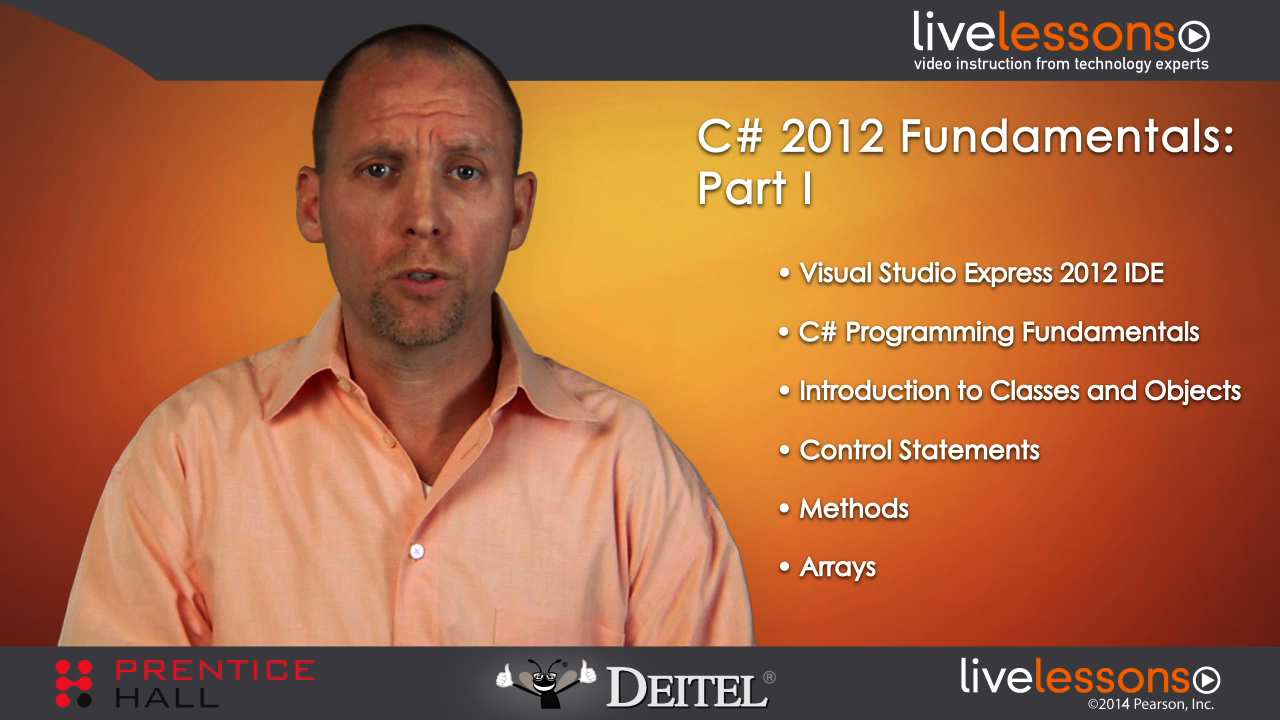C# 2012 Fundamentals LiveLessons Part I of IV (Video Training)
- By Paul Deitel
- Published Nov 21, 2013 by Pearson. Part of the LiveLessons series.

Downloadable Video
- Sorry, this book is no longer in print.
- About this video
Accessible from your Account page after purchase. Requires the free QuickTime Player software.
Videos can be viewed on: Windows 8, Windows XP, Vista, 7, and all versions of Macintosh OS X including the iPad, and other platforms that support the industry standard h.264 video codec.
Register your product to gain access to bonus material or receive a coupon.
Description
- Copyright 2014
- Edition: 1st
- Downloadable Video
- ISBN-10: 0-13-349090-4
- ISBN-13: 978-0-13-349090-9
7+ Hours of Video Instruction
C# 2012 Fundamentals LiveLessons Part I¿ is an introduction to developing applications in the C# 2012 programming language.¿ You begin by exploring the Visual Studio IDE.¿ Then you learn about core C# constructs, including classes, objects, and methods.¿ You move on to explore program control, and end with a lesson on exception handling.
Paul Deitel is co-founder of Deitel & Associates, Inc. and co-author of the best-selling C# 2012 For Programmers, 5/e. He is a Microsoft C# MVP. In this LiveLesson, Paul starts by showing viewers how to set up a C# development environment. He goes on to cover core C# programming concepts, including strings, classes, objects, control statements, and methods. Paul ends the lesson with an in-depth examination of arrays in C#.
NOTE this LiveLesson is one in a series of four:
- C# 2012 Fundamentals LiveLessons Part II
- C# 2012 Fundamentals LiveLessons Part III
- C# 2012 Fundamentals LiveLessons Part IV
Table of Contents:
Lesson 1: Setting Up Your Windows Environment
1.1 Introduction
1.2 Setting up your development environment
Lesson 2: Test-Driving a C# App Using Visual Studio for Windows Desktop
2.1 Introduction
2.2 Test-Driving a C# App Using Visual Studio for Windows Desktop
Lesson 3: Dive Into® Visual Studio Express 2012 for Windows Desktop
3.1 Introduction
3.2 Overview of the IDE and creating a new project
3.3 IDE Menus and Toolbars
3.4 Navigating the IDE
3.5 Using Help
3.6 Using Visual App Development to Create a Simple App that Displays Text and an Image
Lesson 4: Introduction to C#
4.1 Introduction
4.2 A Simple C# App: Displaying a Line of Text
4.3 Creating a Simple App in Visual Studio
4.4 Displaying a Single Line of Text with Multiple Statements
4.5 Displaying Multiple Lines of Text with a Single Statement
4.6 Formatting Text with Console.Write and Console.WriteLine
4.7 Adding Integers
4.8 Decision Making: Equality and Relational Operators
Lesson 5: Introduction to Classes, Objexts Methods and Strings
5.1 Introduction
5.2 Declaring a Class with a Method and Instantiating an Object of That Class
5.3 Declaring a Method with a Parameter
5.4 Instance Variables and Properties
5.5 Value Types vs. Reference Types
5.6 Initializing Objects with Constructors
5.7 Floating-Point Numbers, Type decimal and Validating Data
Lesson 6: Control Statements: Part 1
6.1 Introduction
6.2 Class Average Using Counter-Controlled Repetition
6.3 Class Average Using Sentinel-Controlled Repetition
6.4 Nested Control Statements
6.5 Compound Assignment Operators
6.6 Increment and Decrement Operators
Lesson 7: Control Statements: Part 2
7.1 Introduction
7.2 Essentials of Counter-Controlled Repetition
7.3 for Repetition Statement
7.4 Summing integers with the for statement
7.5 Compound Interest Calculations with for
7.6 do…while Repetition Statement
7.7 switch Multiple-Selection Statement
7.8 break Statement Exiting a for Statement
7.9 continue Statement Terminating an Iteration of a for Statement
7.10 Logical Operators
Lesson 8: Methods: A Deeper Look
8.1 Introduction
8.2 static Methods: User-Defined Method maximum
8.3 Three Ways to Call a Method
8.4 Promotion Rules
8.5 The .NET Framework Class Library
8.6 Shifted and Scaled Random Numbers for Rolling a Six-Sided Die
8.7 Roll a Six-Sided Die 6,000,000 Times
8.8 Case Study: A Game of Chance; Introducing Enumerations
8.9 Scope of Declarations
8.10 Method Overloading
8.11 Optional Parameters
8.12 Named Parameters
8.13 A Simple Example of Recursion: Factorial
8.14 Passing Arguments By Value and By Reference
Lesson 9: Arrays; Introduction to Exception Handling
9.1 Introduction
9.2 Creating an Array
9.3 Using an Array Initializer
9.4 Calculating a Value to Store in Each Element of an Array; Introducing const
9.5 Summing the Elements of an Array
9.6 Using Bar Charts to Display Data Graphically
9.8 Using the Elements of an Array as Counters
9.8 Using Arrays to Analyze Survey Results; Introduction to Exception Handling
9.10 Card Shuffling and Dealing Simulation; Introducing Arrays of References to Objects and the ToString method.
9.11 foreach Repetition Statement
9.12 Passing Arrays and Array Elements to Methods
9.13 Passing Arrays by Value and by Reference
9.14 Case Study: GradeBook Using an Array to Store Grades
9.15 Multidimensional Arrays
9.16 Case Study: GradeBook Using a Rectangular Array
9.17 Variable-Length Argument Lists
9.18 Using Command-Line Arguments
Summary
LiveLessons Video Training series publishes hundreds of hands-on, expert-led video tutorials covering a wide selection of technology topics designed to teach you the skills you need to succeed. This professional and personal technology video series features world-leading author instructors published by your trusted technology brands: Addison-Wesley, Cisco Press, IBM Press, Pearson IT Certification, Prentice Hall, Sams, and Que. Topics include: IT Certification, Programming, Web Development, Mobile Development, Home and Office Technologies, Business and Management, and more. View all LiveLessons on InformIT at http://www.informit.com/imprint/series_detail.aspx?ser=2185116
More Information
